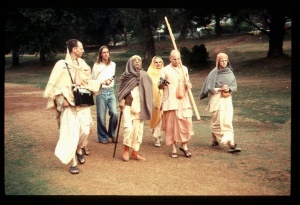SB 4.27.20

A.C. Bhaktivedanta Swami Prabhupada
TEXT 20
- daurbhāgyenātmano loke
- viśrutā durbhageti sā
- yā tuṣṭā rājarṣaye tu
- vṛtādāt pūrave varam
SYNONYMS
daurbhāgyena — on account of misfortune; ātmanaḥ — of herself; loke — in the world; viśrutā — celebrated; durbhagā — most unfortunate; iti — thus; sā — she; yā — who; tuṣṭā — being satisfied; rāja-ṛṣaye — unto the great king; tu — but; vṛtā — being accepted; adāt — delivered; pūrave — unto King Pūru; varam — benediction.
TRANSLATION
The daughter of Time [Jarā] was very unfortunate. Consequently she was known as Durbhagā ["ill-fated"]. However, she was once pleased with a great king, and because the king accepted her, she granted him a great benediction.
PURPORT
As Bhaktivinoda Ṭhākura sings, saba sukha bhāgala: all kinds of happiness disappear in old age. Consequently, no one likes old age, or jarā. Thus Jarā, as the daughter of Time, is known as a most unfortunate daughter. She was, however, at one time accepted by a great king, Yayāti. Yayāti was cursed by his father-in-law, Śukrācārya, to accept her. When Śukrācārya's daughter was married to King Yayāti, one of her friends named Śarmiṣṭhā went with her. Later King Yayāti became very much attached to Śarmiṣṭhā, and Śukrācārya's daughter complained to her father. Consequently, Śukrācārya cursed King Yayāti to become prematurely old. King Yayāti had five youthful sons, and he begged all his sons to exchange their youth for his old age. No one agreed except the youngest son, whose name was Pūru. Upon accepting Yayāti's old age, Pūru was given the kingdom. It is said that two of Yayāti's other sons, being disobedient to their father, were given kingdoms outside of India, most probably Turkey and Greece. The purport is that one can accumulate wealth and all kinds of material opulences, but during old age one cannot enjoy them. Although Pūru attained his father's kingdom, he could not enjoy all the opulence, for he had sacrificed his youth. One should not wait for old age in order to become Kṛṣṇa conscious. Due to the invalidity of old age, one cannot make progress in Kṛṣṇa consciousness, however opulent he may be materially.